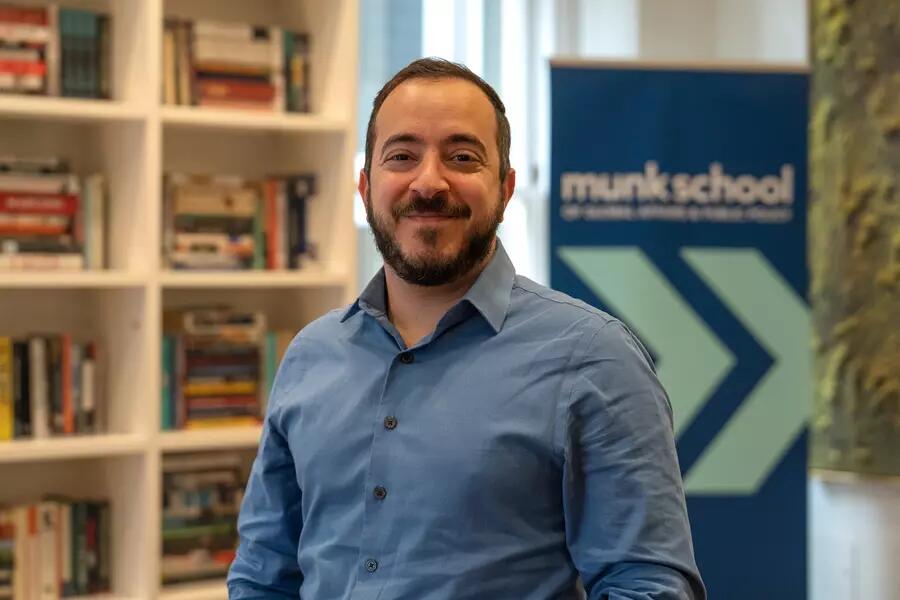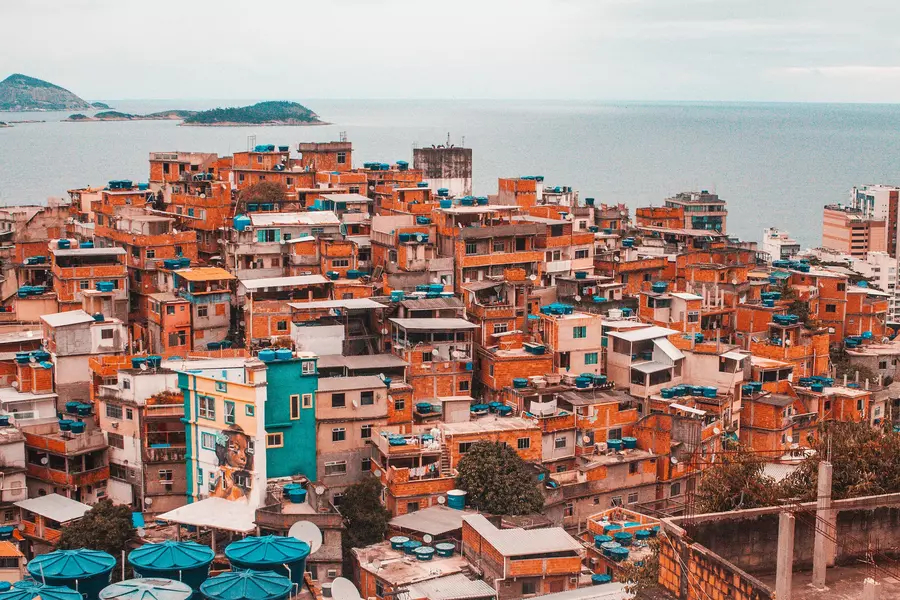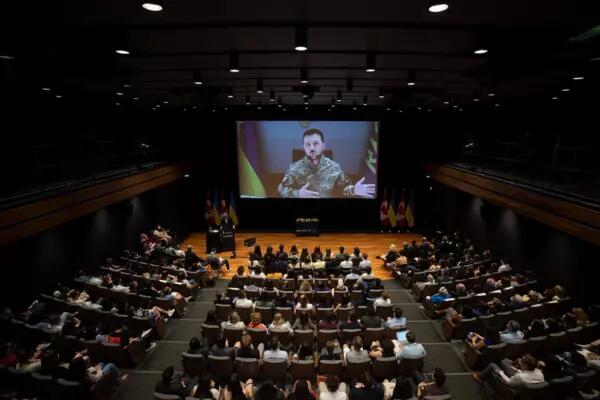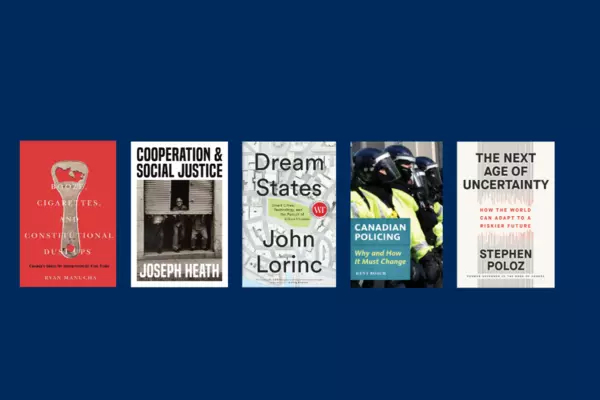
Dani Nedal is an Assistant Professor at the University of Toronto, jointly appointed at the Department of Political Science and the Munk School. His work focuses on topics related to global security and international order. We spoke with Nedal about his book manuscript, his teaching philosophy, and why an interdisciplinary approach is imperative to his research.
You say you take an eclectic approach to studying and teaching world politics. Let’s start there.
Deng Xiaoping, the leader who opened China up to the world, had a saying: “I don't care if the cat is black or white, as long as it catches mice.” And that's how I approach scholarship. I don't care if it's this or that, as long as it gives me an interesting answer to an interesting problem.
I'm eclectic in a variety of different ways. I did my B.A. in international relations in Brazil, in a department that prides itself on critical approaches to international politics. So I was exposed to a lot of critical theory, post-structuralism, post-modernism, feminist theory, and post-colonialism as well as more "mainstream" approaches. I got my PhD at Georgetown, in a department that embraces theoretical and methodological pluralism, where I got to work with colleagues and mentors who were doing really innovative work, both empirically and theoretically.
By virtue of having come from a place like Brazil and having had exposure to a number of different traditions and different fields, my research tends to be interdisciplinary. I've spent much of my career working with folks who are not political scientists. I've worked with historians, lawyers, economists… And it has come to inform how I approach studying international politics. I take a little bit from here and there, and try to craft interesting answers to the puzzles that drive me with regards to political violence, interstate conflict, nuclear proliferation, and nuclear strategy.
That’s what I mean by eclectic. I'm open to different philosophical, methodological, and theoretical approaches.
Your research interests are in international politics and conflict, urban geography and how that influences conflict. How did you arrive there?
I can identify a couple of experiences that led me to where I am starting with early childhood. I am Brazilian and Jewish, a child of immigrants, who grew up hearing stories of conflict and war. I grew up in Rio de Janeiro, a city that is marked by urban violence in a variety of different forms. That, I think, shaped some of the things that I think are important, but the real story of how I started working on cities and security is a lot more tortuous.
Early on in undergrad, I got to work with many interesting people doing interesting things in a variety of contexts. For instance, I had a job working in the China-Brazil Business Council, which is the main private sector body charged with promoting commercial ties between Brazil and China. That was very different from what I thought I would be doing with my life — when I started college, I thought I was going to go into diplomacy. But I had a great time working there. I had a chance to really impact policy and meet experts on China from around the world: from China, the US, Canada, Germany, Mexico. It informed my perspective on China, which is one of the most important topics in international politics today, and opened a lot of doors for me.
Additionally, I always had a burning interest in security. So after a couple of years, I left the work with the China-Brazil Business Council and started working with Matias Spektor. He had just come back from doing his PhD at Oxford and was interested in trying to modernize the study of Brazilian foreign policy.
Working with him, I got a chance to immerse myself in the archival records of Brazilian foreign policy from the 1990s, when Brazil was opening itself up to the world after spending two decades under military rule. I spent a lot of time in the archives, looking at documents produced by the highest levels of decision-making in Brazilian foreign policy, like the ministers and the president. I also participated in oral history interviews, interviewing diplomats and other government officials. That work shaped a lot of how I think about decision-making and foreign policy.
Through that work, I also had the opportunity to connect with and learn from a wide variety of scholars and practitioners from around the world. One of those scholars was Nicholas Wheeler, who at the time was interested in the history of Brazilian and Argentinean nuclear relations in the broader context of how to build trust between two rival states that have nuclear potential. We were doing a lot of work on the history of the Brazilian nuclear program and its international influences. Wheeler was then a professor at Aberystwhyth, the birthplace of IR as a field of study. We developed a great intellectual partnership, thinking through some of the deeper issues involving how to build trust in international politics, and how the existence of nuclear weapons shape both the limitations and the incentives for building trust. I eventually joined Wheeler's project as a research assistant at Aber and spent a lot of time working on trust-building between rivals, and it cemented my interest in the field of nuclear security.
It wasn't until I started the PhD that I connected some of these dots and began thinking more systematically about the revolutionary character of nuclear weapons and the centrality of cities in the nuclear age.

What’s the most interesting question that you're trying to answer right now?
I don't know if it's the most interesting question, but it's definitely the one I've spent the most time on for the last 10 years or so. It's the question of how urbanization impacts international relations.
Nowadays, most people live in cities. Most countries depend primarily on the activities that go on in cities, and most of the added value in the economy comes from cities. Cities are the political bedrock of modern states and the backbone of industrial military power.
But a lot of our approaches to international politics don't fully acknowledge the importance of urbanization. Highly urbanized states function differently from less urbanized states, and there are differences in the ways in which these countries are spatially organized. There might be one major city that has a large proportion of a country's urban population, as opposed to multiple cities spread out throughout the country. And that, I argue, plays a role in shaping how decision-makers think about the costs of things like going to war.
If you're in South Korea and you have more than 50 percent of the population living in one city, 30 miles from the border with North Korea, that's fundamentally different than if you're, say, a country like the U.S. where you have multiple cities, none of which individually hold that great a share of the population. What are the implications of this for how officials think about the prospects for war and peace? Or the utility of nuclear weapons? Or about the emergence of new technologies? What impact does the spatial concentration of populations have on the probability of internal violence?
Those are some of the big questions that drive me.
That's the perfect segue into your book, Urban Warfare and Urban Peace. Tell us about that.
The book attempts to answer one of these questions — what are the implications of urbanization and urban concentration for the prospects of war and peace in the last hundred years or so? It draws from a number of different academic disciplines — history, geography, political science, economics — to think about the role of geography and how to think about the vulnerability of cities to the instruments of modern warfare.
The argument in the book is that countries that have a majority of the population living in one or maybe a couple of cities, experience that vulnerability more acutely. Leaders realize that cities that hold a large portion of a country’s population are likely to be targeted in war even in early stages of a conflict, which makes their country more vulnerable to coercion.
For a while, some people came to think of conflict as low-intensity, irregular or hybrid warfare in remote places, or that urban warfare would be primarily about high-tech armies fighting urban guerrillas, but what we're seeing in Ukraine right now has reminded the world that large scale destruction of cities is still very much a possibility in contemporary conflict. I argue that this possibility has loomed large since the early 20th century, and has been especially concerning for countries with few cities to spare. As a result, countries with very few, vulnerable cities become more cautious in their dealings with other countries that have the means to attack their key urban areas. The downside to this, of course, is that this feeling of being exposed to danger can be psychologically taxing — nobody likes to feel vulnerable –and politically troublesome. But the potential upside is that the underlying awareness of vulnerability can contribute to international peace. Vulnerable countries might adapt their behaviour to avoid conflicts, make peace with their neighbors, and make allies that can help them secure their territory. That’s the book’s bottom line: that the rise of urban warfare may have contributed to an urban peace.

Your research draws from many different fields. Why is it important for you to take an interdisciplinary approach to your research?
Political science is a relatively young discipline that is still finding its footing. It's still developing its own vocabulary and trying to figure out what makes it distinct from sister disciplines like sociology or anthropology. Often, scholars try to do that by walling themselves off. Political science tries to define its identity through a process of exclusion. We say, “Oh, we are not historians. We need to approach this from a 'scientific' perspective, which means we're going to exclude things that we see as unscientific, like observational and ethnographic methods.”
But I think that by doing that, you end up with tunnel vision. Other disciplines are often trying to address the same problem from different angles, and by excluding them you end up missing important parts of the puzzle. You force yourself to rediscover the wheel. Being open to different perspectives allows you to get a more complete picture of the whole.
Last question: why teach at the Munk School?
I think that it's important to teach students who want to pursue careers in global affairs and public policy about the bread and butter of "traditional" international relations. One of my ambitions is to influence policy, and there's no better way of doing that than training future policymakers and leaders. The Munk School understands that. A part of the mission, as I understand it, is to form generations of policy-makers as well as global citizens.
Academics can actually change things, but not just by publishing a book or an article. They can effect change by training students to ask the right questions, be open in how they answer those questions, and be critical in their thinking about problems. And that's where I think I fit in. I'm on board with that mission.


